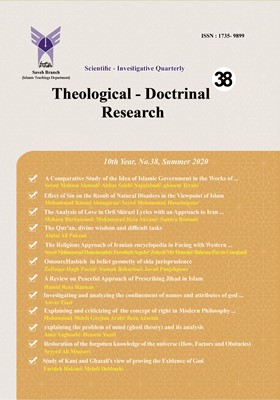OmoureHasbieh in beliet geometiy of shia jurisprudence
Subject Areas : Islamic theologyJavad Panjehpour 1 * , siyamak baharloei 2
1 -
2 -
Keywords: Enjoining good and forbidding wrong, Public welfare, Public works, Sheriff,
Abstract :
The subject of public welfare and public works are important issues among Muslim philosophers such as Shi'a and Sunni. On the one hand, this issue, similar to some other issues in governmental jurisprudence, has partly been influenced by verbal differences between Sunnis and Shi'as. Accordingly, the Sunni people had paid more attention to the public aspect of public affairs due to the acceptance of caliphate sovereignty, but Shiite jurisprudents had often considered most non-governmental aspects of public affairs. The proper unity and appropriate consensus between the jurists (in their foundations and approaches to the public welfare and public works) in the expansion and limitation of the extent of the implementation of these divine commandments are not observed (although there is a consensus in the sense of affairs). This discrepancy indicates that each of them has different foundations and approaches compared to public welfare. According to the above descriptions, there are two theories and views on the excerpts of the public works. The first view is that the domain of this institution is limited to the guardianship of the estate of the orphans, insane people, and bankrupt orphans. The second view does not limit the scope of public works to specific issues and has a wider perspective than the first view, which also includes social, economic, political, and cultural issues. Even though the public works are one of the vague issues in legal affairs, legislators have not considered a comprehensive definition of it and have not provided an effective criterion for identifying it. Therefore, the main objective of this research is the comparative study of public works for the jurisprudence of Shia and Sunni jurisprudence' views by the codified statue. Also, the findings of this research show that the scope of public works in the Sunni jurisprudence is limited to the issue of Enjoining good and forbidding wrong, but for the Shiite jurisprudents, it covers everything that leads to the disorder in a social system and the fault in society. Thus, the concept of public works is beyond enjoining good and forbidding wrong.
ابن اثیر، محمدبن مبارک جزری(1367)؛ «النهایه فی غریب الحدیث و الاثر»، چاپ چهارم، محمود محمدطناحی، قم: موسسه مطبوعاتی اسماعیلیان، بی تا، ج 1، ص 382.
ابن اخوه، محمدبن محمد القرشی(1394) ؛ «معالم القربة فى احکام الحسبة»، چاپ چهارم، جعفر شعار، تهران: مرکز نشر علمی و فرهنگی، بی جا، 1408 ه.ق، ص23.
ابن تیمیه، ابوعباس تقی الدین احمدبن عبدالسلام؛ «الحسبه فی الاسلام و وظیفه الحکومه الاسلامیه»، قاهره: مطبوعات الشعب، 1976 م، ص13.
ابن خلدون، عبدالرحمن؛ «مقدّمه ابن خلدون»، الطبعه الرابع، لبنان بیروت: دارالکتاب العلمیه 1398ه.ق، ص178.
ابن منظور، محمدبن مکرم مقرمی؛ «لسان العرب»، تهران: المجد، انتشارات اسماعیلیان، 1362.
ابوطالبی، مهدی؛ «مفهوم حسبه از نظر علمای شیعه و سنی»، مجله معرفت، قم: مؤسسه آموزشی و پژوهشی امام خمینی.
آل بحر العلوم، محمدتقی؛ «بلغة الفقیه»، چاپ چهارم. تهران: مکتبه الصادق(ع).
تبریزی، آیت الله شیخ جواد؛ «ارشاد الطالب فی شرح المکاسب» ، جلد پنج، مرتضی انصاری، قم: دارالصدیقه الشهیده(س).
خمینی، امام سید روح الله(1368)؛ «کتاب البیع»، جلد اول، تهران: موسسه تنظیم و نشر آثار امام خمینی(س)، 1379.
سبزواری، محمدباقر بن محمد مومن(1381)؛ «کفایه الاحکام»، چاپ اول، مرتضی واعظی اراکی، قم: موسسه نشر الاسلامی.
شیزری ،عبدالرحمان بن نصر(م ح 589 ه)؛ «نهایه الرتبه فی طلب الحسبه» ، سید باز عرینی، قاهره ، 1946 م.
طباطبایی یزدی، سیدمحمد مهدی(1392)؛ «العروه الوثقی»، تهران: انتشارات دینا.
عمید زنجانی، عباسعلی (1384). فقه سیاسی. تهران: امیرکبیر.
غزالی، محمد(1389)؛ «احیاء علوم الدین» ،چاپ هفتم، مویدالدین محمد خوارزمی، تهران: انتشارات علمی و فرهنگی.
فیض کاشانی،مولی محمدمحسن(1401 ق)؛ «مفاتیح الشرایع»، سید مهدی رجائی، قم: انتشارات خیام.
قمی، شیخ عباس(1414 ق)؛ «سفینه البحار»، ایران: نشر اسوه.
ماوردی، ابوالحسن علی بن محمد بن حبیب(450-364 ق)؛ «الاحکام السلطانیه»، بیروت: دارالفکر.
منتظرى، حسینعلی (1301)؛ «دراسات فى ولایة الفقیه و فقه الدولة الاسلامیة»، جلد دوم، فصل پنجم، قم: دارالفکر.
نائینی، میرزا محمّدحسین(1382)؛ «تنبیه الامه و تنزیه المله»، تهران: انتشارات امیرکبیر.
نجفی، محمّدحسن (1367)؛ «جواهرالکلام»، جلد 21، تهران: انتشارات اسلامی.
رفیعی، حسن رضا(1378)؛ «مفهوم حسبه در قرآن، حدیث و آثار فقهای اسلامی»، مجله دانش انتظامی.
عمید زنجانی، عباسعلی (1376)؛ «دیدگاه حکومتی در نظریه حسبه فرضیه حکومت با اختیارات محدود»، فصلنامه حکومت اسلامی، شماره 3.
قنبری، حمید (1382)؛ «مقارنه آرای امامیه و اهل سنت در حسبه و امور حسبه»، مجله مطالعات اسلامی، دانشکده الهیات و معارف اسلامی دانشگاه مشهد، پاییز، ش 61.

